Ready to Share Your Knowledge?
Want to turn your expertise into a profitable online course? Choosing the best platform to sell online courses is crucial for success. This list examines seven leading platforms—Tevello, Teachable, Thinkific, Kajabi, Podia, LearnWorlds, and Udemy—to help Shopify store owners and creative entrepreneurs like you find the perfect fit. We'll break down features, pricing, pros, and cons so you can easily compare and select the right tool to build, market, and sell your online courses. Stop struggling with scattered content and start earning from your knowledge.
1. Tevello
If you're a Shopify store owner looking for the best platform to sell online courses and digital products without the hassle of managing a separate learning site, Tevello might be your ideal solution. This powerful platform seamlessly integrates with your existing Shopify storefront, transforming it into a comprehensive eLearning hub. This means you can offer digital courses, membership communities, subscription modules, interactive workshops, and more, all within the familiar environment your customers already trust. This approach streamlines the customer journey and maximizes opportunities for upselling and cross-selling related products and educational content. Imagine offering a crafting course alongside the materials needed, all within your Shopify store – that's the power of Tevello.
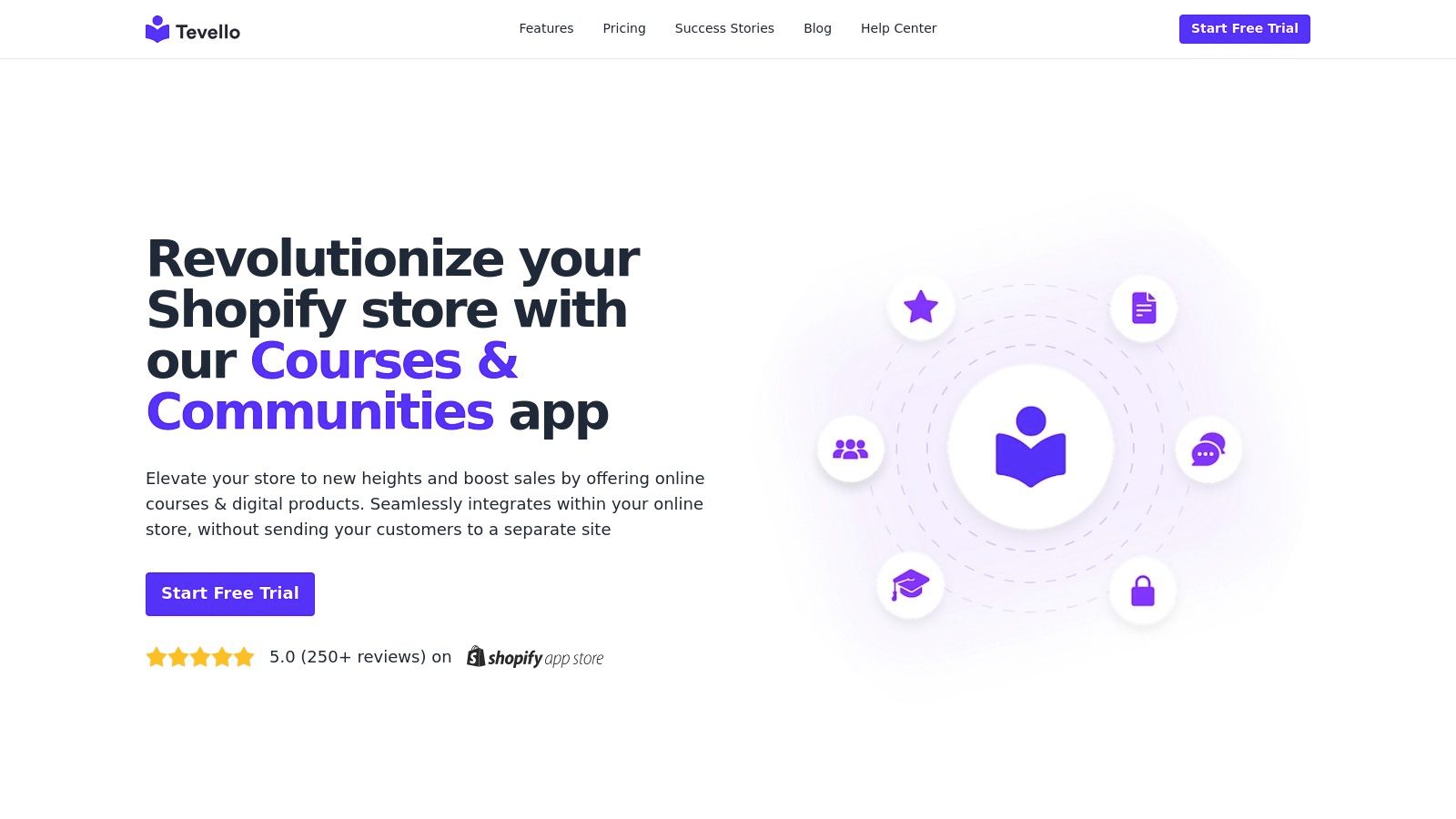
For businesses like arts and crafts stores on Shopify, Tevello offers a particularly compelling value proposition. Consider a scenario where you sell knitting supplies. With Tevello, you could seamlessly integrate knitting courses, workshops, or even a membership community for knitters directly into your product pages. This not only provides added value for your customers but also opens up new revenue streams and fosters a loyal community around your brand. Tevello’s success stories, such as Crochetmilie selling over 4,000 courses and achieving significant revenue growth, demonstrate its effectiveness.
Tevello boasts a range of features designed to enhance both the learning experience and your administrative efficiency. You can create customizable learning paths, automate customer onboarding and course enrollments using Shopify Flow, and leverage robust video hosting options, including self-hosting and integrations with Vimeo, Wistia, and YouTube. Multilingual support and flexible community settings (open, private, secret, or hidden) cater to diverse business needs and global audiences. Automated features like Shopify Flow integration streamline administrative tasks, freeing you to focus on content creation and community building.
Pros:
- Seamless Shopify Integration: Eliminates the need for a separate learning platform, providing a unified experience for your customers.
- Comprehensive Features: Offers customizable learning paths, automated onboarding, robust video hosting, and integrated community features.
- Upselling and Cross-selling Potential: Facilitates the promotion of related products and courses within the familiar Shopify environment.
- Multilingual and Flexible: Supports multiple languages and offers adaptable community settings to meet diverse business requirements.
- Hands-on Support: Backed by industry-leading customer support and proven success stories.
Cons:
- Shopify Exclusive: Limited to Shopify stores, restricting its use for businesses on other eCommerce platforms.
- Pricing Opacity: Pricing details are not readily available, potentially making budget planning difficult for smaller businesses.
While Tevello's Shopify exclusivity might be a limitation for some, its seamless integration and comprehensive feature set make it a powerful best platform to sell online courses for Shopify users. For those seeking a streamlined, all-in-one solution for selling digital educational content and building a thriving online community, Tevello deserves serious consideration. To explore Tevello further and determine if it fits your specific needs, visit their website: https://tevello.com
2. Teachable
Teachable is a robust platform specifically designed for creating, marketing, and selling online courses. It provides a comprehensive suite of tools that empower creators to manage every aspect of their online course business, from building the curriculum to processing payments and interacting with students. This makes it a strong contender for one of the best platforms to sell online courses, particularly for Shopify store owners and arts and crafts business owners looking to expand their offerings and reach a wider audience. If you're looking for a platform where you maintain complete control over your brand and student data, Teachable is a compelling option. You can build a fully customized course website, host unlimited videos, manage student interactions, and handle payments all within the platform.
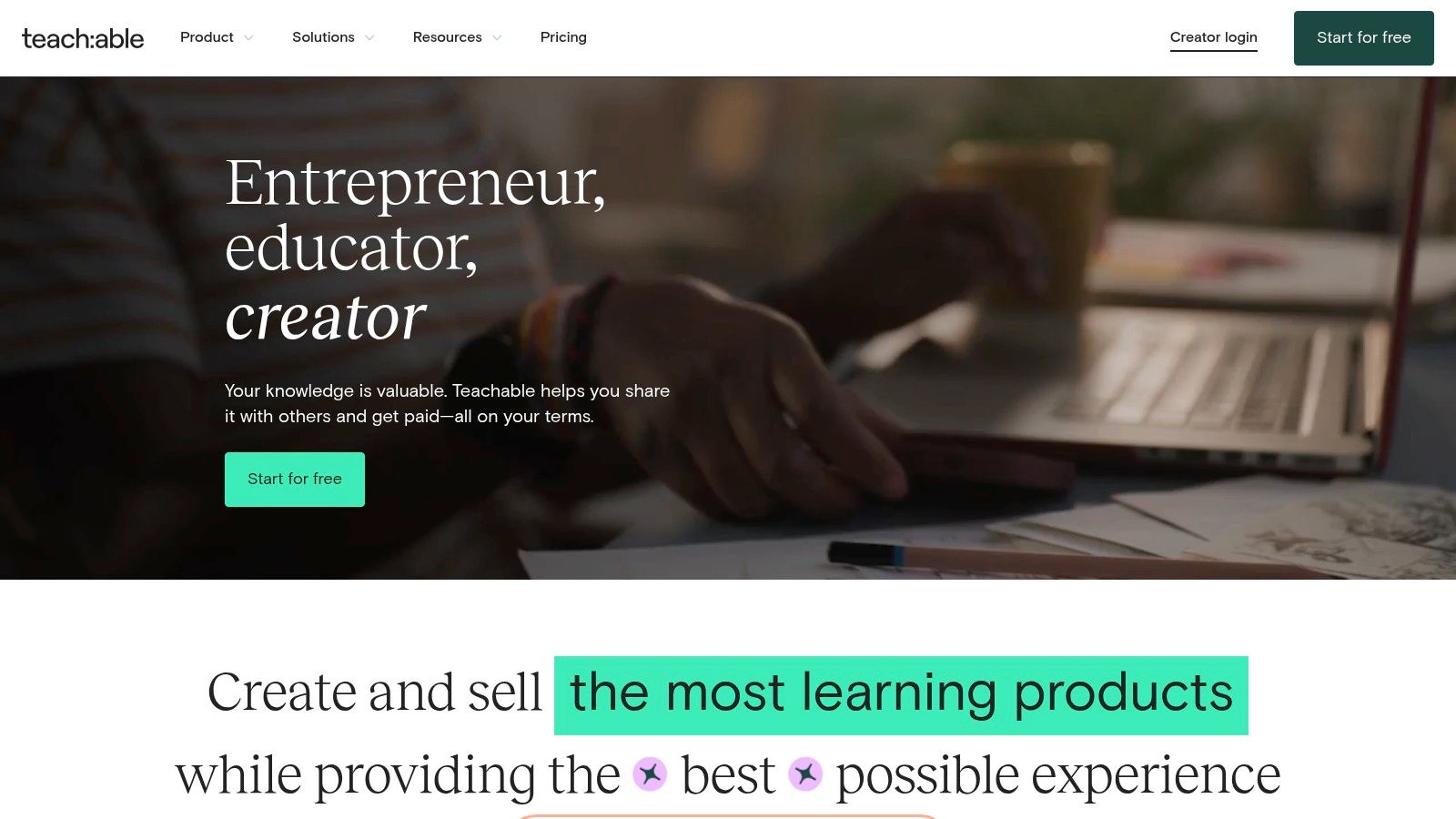
For Shopify store owners, Teachable can be a powerful tool to complement your existing product offerings. Imagine selling online courses teaching customers how to use your products, crafting techniques, or even business strategies related to your niche. This can not only generate additional revenue streams but also foster a stronger community around your brand. Similarly, for arts and crafts business owners, Teachable allows you to share your expertise and passion by creating courses on specific techniques, project tutorials, or even business skills for fellow artisans. You can monetize your knowledge and build a loyal following of students eager to learn from you.
Teachable's ease of use is a major advantage, especially for creators without technical expertise. The intuitive interface allows you to quickly build your course curriculum, upload videos, and customize your course website with minimal hassle. Features like integrated payment processing (supporting PayPal and Stripe) and built-in email marketing tools streamline the sales and marketing processes, saving you time and effort. Advanced features such as quizzes and course completion certificates enhance the learning experience and provide valuable feedback to both students and instructors.
While Teachable excels in its comprehensive feature set and user-friendliness, it's essential to consider the pricing structure. While higher-tier plans eliminate transaction fees, the basic plan includes a 5% transaction fee. This is something to consider if you're just starting out. Also, while Teachable offers custom domain and white-labeling options, theme customization is somewhat limited. Finally, while Teachable boasts an excellent student management system and robust analytics, it lacks built-in community features. You'll need to integrate with third-party platforms if you want to foster a sense of community among your students. Learn more about Teachable and compare its features against other options.
Pros:
- No transaction fees on higher-tier plans
- Excellent student management system
- Robust analytics and reporting features
- Mobile-responsive course delivery
- Unlimited video hosting and course content
Cons:
- Higher pricing compared to some competitors
- Limited theme customization options
- Transaction fees on the basic plan (5%)
- No built-in community features (requires third-party integration)
Website: https://www.teachable.com
3. Thinkific
Thinkific is a robust platform specifically designed for creating, marketing, and selling online courses. It's a popular choice among serious course creators, especially those prioritizing content ownership, scalability, and student engagement. Whether you're a Shopify store owner looking to diversify your offerings with online workshops or an arts and crafts business owner wanting to teach your unique skills, Thinkific provides the tools you need to build a thriving online education business. This platform earns its spot on our list of best platforms to sell online courses due to its comprehensive features and focus on student success. It allows you to build interactive courses, assess student progress, and foster a sense of community all within a single platform.
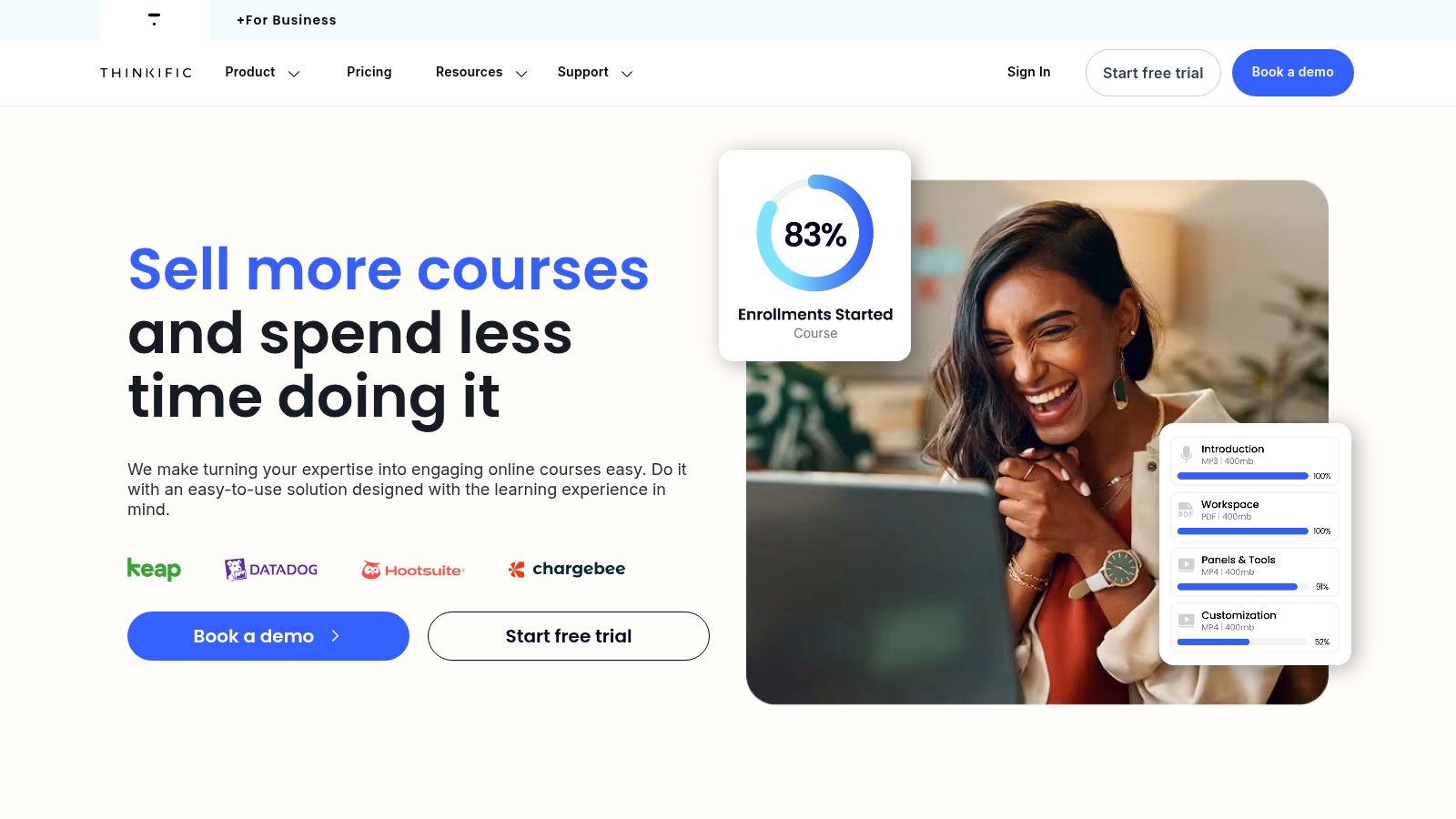
Thinkific’s drag-and-drop course builder simplifies the process of creating engaging learning experiences. You can incorporate multimedia content, quizzes, and surveys to make your courses interactive and assess student understanding. For example, a Shopify store owner selling handmade jewelry could create a course demonstrating jewelry-making techniques, incorporating videos, downloadable resource materials, and quizzes to test comprehension. An arts and crafts business owner could offer a series of online workshops demonstrating different painting styles, using the platform's built-in community feature to facilitate student interaction and feedback. Learn more about Thinkific and how it compares to other platforms.
Thinkific offers unlimited courses and students on all its plans, catering to businesses of all sizes. The advanced quiz and survey capabilities allow you to track student progress and identify areas where they might need additional support. The built-in community feature fosters a sense of belonging among your students, encouraging peer-to-peer learning and boosting engagement. Features like multiple instructor accounts and bulk enrollments streamline administrative tasks, making it easier to manage your growing online education business.
Features:
- Comprehensive course builder with drag-and-drop functionality
- Unlimited courses and students on all plans
- Advanced quiz and survey capabilities
- Built-in community feature for student engagement
- Multiple instructor accounts and bulk enrollments
Pros:
- No transaction fees on any plan: This is a significant advantage, especially as your sales grow.
- Excellent customer support: Thinkific is known for its responsive and helpful customer support team.
- Strong focus on course completion and student success: The platform provides tools to track student progress and encourage engagement.
- Robust site design customization options: You can tailor the look and feel of your course website to match your brand.
Cons:
- More expensive monthly plans than some alternatives: While offering valuable features, Thinkific’s pricing might be a barrier for some, especially beginners.
- Steeper learning curve for beginners: While the drag-and-drop builder is user-friendly, mastering all of Thinkific’s features can take time.
- Limited marketing tools on lower-tier plans: You might need to integrate with third-party marketing tools for more advanced functionalities.
- Email marketing features not as robust as specialized tools: Consider integrating with dedicated email marketing platforms for more sophisticated campaigns.
Website: https://www.thinkific.com
Thinkific empowers you to create a professional and engaging online learning environment. While it does come with a steeper learning curve and higher price point than some competitors, its comprehensive features, focus on student success, and lack of transaction fees make it a powerful platform for those serious about building a scalable online course business.
4. Kajabi
Kajabi stands out as a premium all-in-one platform specifically designed for established creators and businesses seeking a robust solution to sell online courses. It goes beyond simple course hosting by providing a comprehensive suite of tools encompassing website building, sophisticated marketing automation, email marketing, sales funnels, memberships, and detailed analytics, making it a powerful contender among the best platforms to sell online courses. This integrated approach eliminates the need for multiple third-party tools, streamlining your workflow and centralizing your business operations. For Shopify store owners or arts and crafts business owners looking to expand into educational content and digital products, Kajabi offers a powerful platform to build, market, and sell online courses alongside your existing physical products. You can create a cohesive brand experience and leverage your existing customer base.
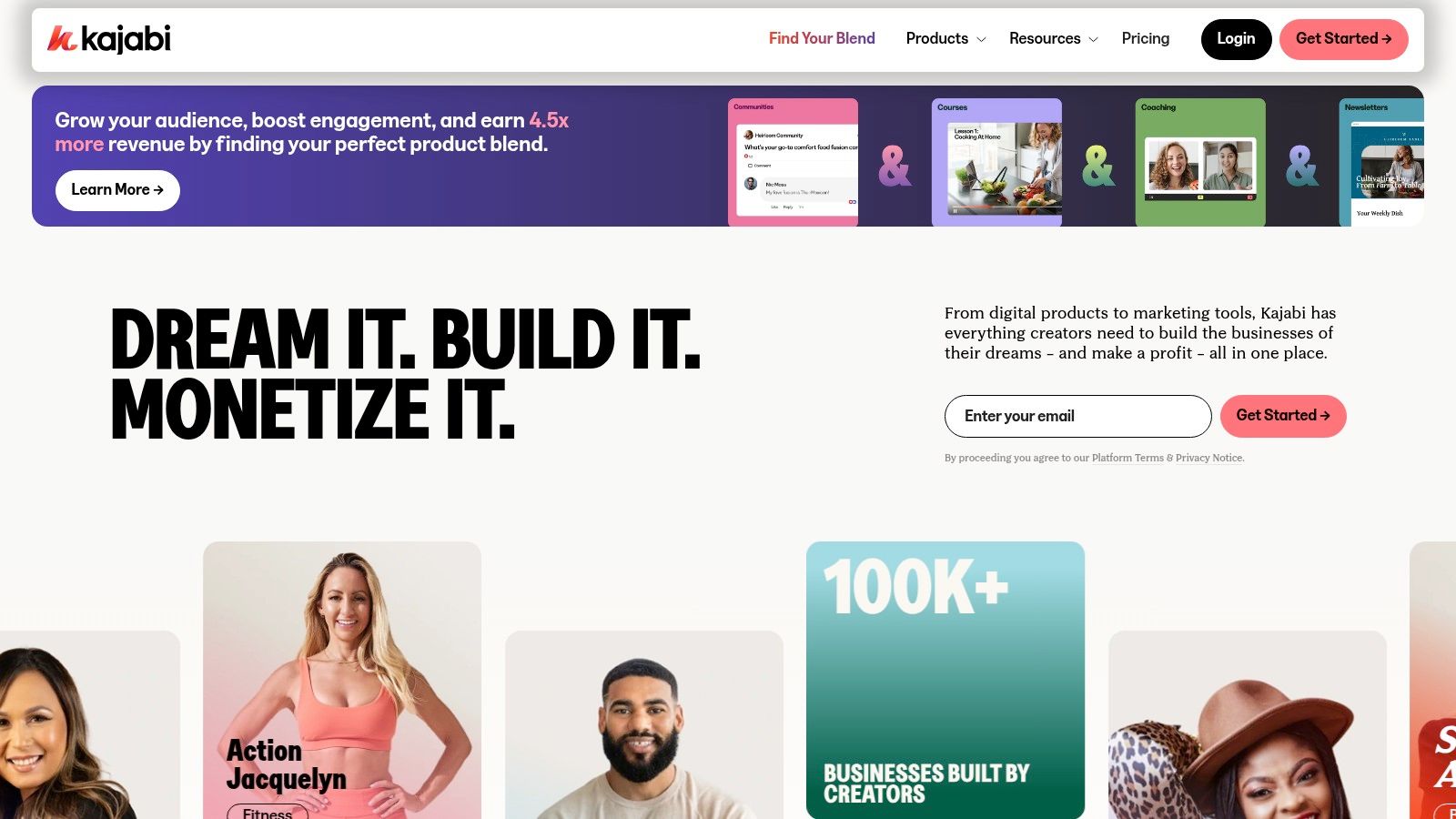
Kajabi truly shines in its marketing automation capabilities. The platform offers a sophisticated pipeline (funnel) builder that allows you to create automated email sequences, track customer behavior, and optimize your sales process. Its built-in email marketing system with segmentation features allows you to target specific customer groups with personalized messages, leading to higher conversion rates. This is particularly useful for Shopify store owners who already have a customer list and want to promote their online courses to a segmented audience. For example, an arts and crafts business owner could create a course on advanced techniques and market it specifically to customers who have purchased related supplies from their Shopify store. Comprehensive analytics dashboards provide valuable insights into every facet of your business, from course completion rates to marketing campaign performance, enabling data-driven decisions and continuous improvement. Kajabi also offers a dedicated mobile app for course delivery, allowing students to access content on the go and enhancing the learning experience. Learn more about Kajabi to see how it stacks up against other platforms.
Kajabi's professional templates and designs allow even non-technical users to create beautiful, high-converting landing pages, sales pages, and course delivery portals. The absence of transaction fees on any of their plans means you keep more of your revenue. However, this comprehensive suite of tools comes at a price. Kajabi is significantly more expensive than other platforms on this list, making it more suitable for established businesses with existing revenue streams. Product limits on lower-tier plans might restrict the number of courses or digital products you can offer, and the platform's extensive features can lead to a steeper learning curve, potentially overwhelming beginners.
Features:
- All-in-one business platform with website, marketing, and product tools
- Advanced automation and pipeline (funnel) builder
- Built-in email marketing system with segmentation
- Comprehensive analytics across all business aspects
- Mobile app for course delivery
Pros:
- Truly all-in-one platform that eliminates the need for multiple tools
- Professional templates and designs
- No transaction fees
- Robust marketing automation capabilities
Cons:
- Significantly higher price point than competitors
- Product limits on lower-tier plans
- Steeper learning curve
- Can be overwhelming for beginners
Website: https://kajabi.com
Kajabi earns its place on this list as the best platform to sell online courses for those who prioritize a fully integrated, powerful marketing engine, and are willing to invest in a premium solution. While it might not be ideal for beginners due to the higher price point and learning curve, established creators and businesses seeking to scale their online course offerings will find Kajabi's comprehensive suite of tools invaluable.
5. Podia: Simplicity and Ease for Selling Online Courses
Podia shines as a user-friendly platform specifically designed for creators looking to sell online courses, digital downloads, and memberships. Its intuitive interface makes it a particularly good choice for beginners or those who prioritize ease of use over extensive customization. Shopify store owners and arts and crafts business owners looking to expand their offerings with online workshops, tutorials, or downloadable patterns will find Podia’s straightforward approach refreshing. It allows you to quickly build a professional-looking storefront without getting bogged down in complex technical details. Podia’s all-inclusive pricing model further simplifies things by eliminating transaction fees and unexpected costs, allowing you to focus on creating and selling your content.
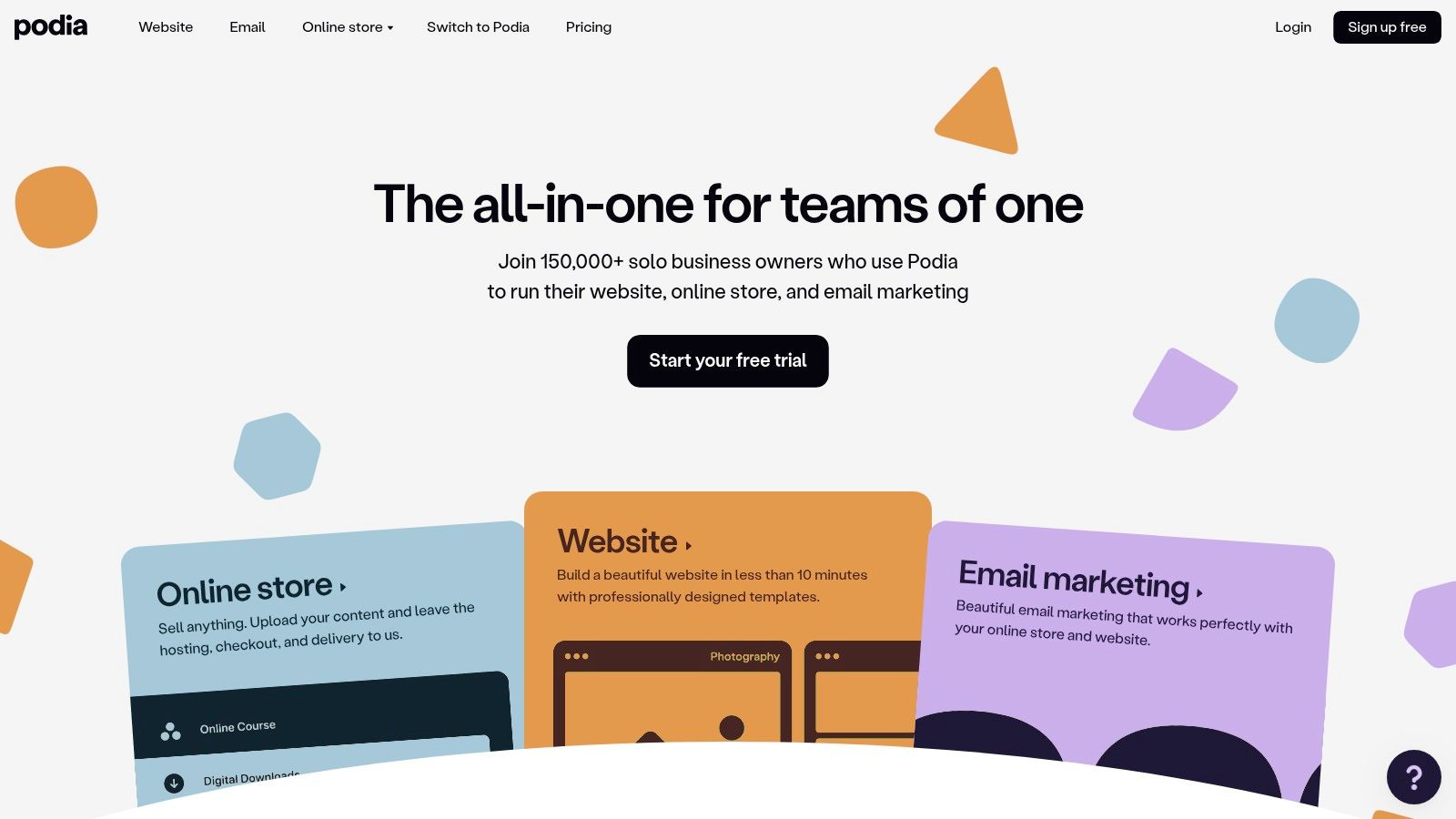
Podia earns its place on this list of best platforms to sell online courses because of its streamlined approach. It allows you to manage everything from courses and digital products to email marketing and customer communication, all from a single, easy-to-navigate dashboard. This centralized system is especially beneficial for Shopify store owners and artists who are likely already juggling multiple platforms. Podia consolidates your online course business, simplifying management and saving valuable time.
For example, a Shopify store owner selling handmade jewelry could easily create a Podia-hosted online course teaching jewelry-making techniques. They could then cross-promote the course on their Shopify store, offering bundled deals or exclusive discounts to existing customers. Similarly, an artist selling paintings could use Podia to sell online painting tutorials or downloadable art prints, diversifying their income streams and reaching a wider audience.
Key Features & Benefits:
- Sell various digital products: Host and sell online courses, digital downloads (like ebooks, templates, and patterns), and memberships, creating diverse income streams.
- Integrated email marketing: Build your email list and nurture leads directly within Podia, simplifying your marketing efforts. This eliminates the need for separate email marketing software, saving you money and streamlining your workflow.
- Live chat support: Receive prompt and helpful assistance from Podia's customer support team, regardless of your subscription plan. This is invaluable for beginners who might need extra guidance during setup and launch.
- Unlimited everything: No restrictions on the number of courses, students, files, or bandwidth, allowing your business to scale without incurring additional costs.
- Embedded checkout & sales pages: Seamlessly integrate your sales pages and checkout process directly into your existing website (including your Shopify store), creating a cohesive brand experience for your customers.
Pros:
- Simple, intuitive interface ideal for beginners.
- No transaction fees.
- All-in-one pricing with no hidden costs.
- Excellent customer support.
Cons:
- Fewer advanced customization options than competitors like Thinkific or Teachable.
- Limited assessment and quiz functionality.
- Basic affiliate marketing features.
- Less robust than other platforms for large-scale operations with thousands of students.
Pricing: Podia offers various pricing plans, starting from a free plan suitable for exploration. The paid plans unlock additional features, such as membership functionality. Visit their website for the most up-to-date pricing.
Technical Requirements: None. Podia is a fully hosted platform, meaning they handle all the technical aspects. You only need a web browser and an internet connection.
Website: https://www.podia.com
Podia is a fantastic option for those new to selling online courses or who prioritize simplicity and ease of use. While it may lack the advanced features of some competitors, its all-inclusive pricing, excellent customer support, and intuitive interface make it a powerful tool for creators, especially Shopify store owners and arts and crafts businesses, looking to effectively expand their reach and monetize their skills and knowledge.
6. LearnWorlds
LearnWorlds is a robust online course platform ideal for creators seeking to deliver a premium, interactive learning experience. If you're a Shopify store owner or an arts and crafts business owner looking to expand your offerings with engaging online workshops or courses, LearnWorlds provides the tools to create a professional online school, rather than just hosting a series of videos. Its focus on community building, interactive elements, and detailed customization options makes it a compelling option for those prioritizing student engagement and building a recognizable brand. This positions LearnWorlds as one of the best platforms to sell online courses, especially for those seeking a sophisticated and interactive approach.

Imagine, for example, a Shopify store owner selling handcrafted jewelry. They could use LearnWorlds to create a comprehensive online course teaching jewelry-making techniques. The interactive video player with notes and transcripts allows students to follow along meticulously, while the built-in community features foster connection and peer-to-peer learning. Similarly, an arts and crafts business owner could leverage LearnWorlds to host online workshops, using the advanced assessment tools to track student progress and provide personalized feedback.
Key features that make LearnWorlds stand out include interactive ebooks and video players, built-in social networking, advanced assessment tools (including question banks), custom mobile app options for your school, and SCORM compliance. This last feature is particularly important for businesses offering certifications or compliance training. Moreover, LearnWorlds provides powerful customization options, enabling you to tailor the platform to reflect your brand aesthetic. The robust analytics and reporting tools also offer valuable insights into student engagement and course performance, allowing you to continuously refine your content and teaching strategies.
Pricing: LearnWorlds offers various pricing tiers, starting with a Starter plan that includes a transaction fee. Higher-tier plans unlock additional features and remove transaction fees but come at a higher price point.
Technical Requirements: LearnWorlds is a cloud-based platform, so there are no specific technical requirements beyond a stable internet connection and a web browser. Creating and uploading your course content requires standard video and document formats.
Pros:
- Highly interactive learning experience with engagement tools
- Strong emphasis on certifications and compliance training
- Powerful customization options for branding
- Excellent analytics and reporting capabilities
Cons:
- Transaction fee on the Starter plan
- Steeper learning curve than simpler platforms
- Higher pricing compared to basic alternatives
- Some advanced features are only available on higher-tier plans
Implementation/Setup Tips:
- Plan your course structure meticulously: Before diving into LearnWorlds, outline your course content and learning objectives.
- Leverage the interactive elements: Maximize the use of interactive videos, quizzes, and assignments to enhance engagement.
- Customize your school's branding: Ensure your online school reflects your brand identity to create a consistent and professional image.
- Explore the community features: Encourage interaction among students to foster a sense of belonging and peer-to-peer learning.
- Utilize the analytics dashboard: Monitor student progress and course performance to identify areas for improvement.
Comparison to Similar Tools: While platforms like Thinkific and Teachable offer simpler interfaces and lower price points, LearnWorlds distinguishes itself through its emphasis on interactivity and community building. If your priority is creating a highly engaging and premium learning experience, LearnWorlds offers a compelling solution.
7. Udemy
Udemy stands out on this list of the best platforms to sell online courses because it operates on a marketplace model, unlike other hosted platforms. This means instructors create and upload their courses to the Udemy marketplace, instantly gaining access to their massive student base of over 40 million learners. This makes Udemy particularly appealing for Shopify store owners and arts and crafts business owners who might be new to online course creation and lack an established audience. Instead of investing time and resources in building an audience from scratch, you can leverage Udemy's existing network to get your courses in front of potential students immediately. While Udemy handles the marketing and technical aspects, it’s important to understand the trade-off involves less control over pricing and branding, along with a significant revenue share going to the platform.
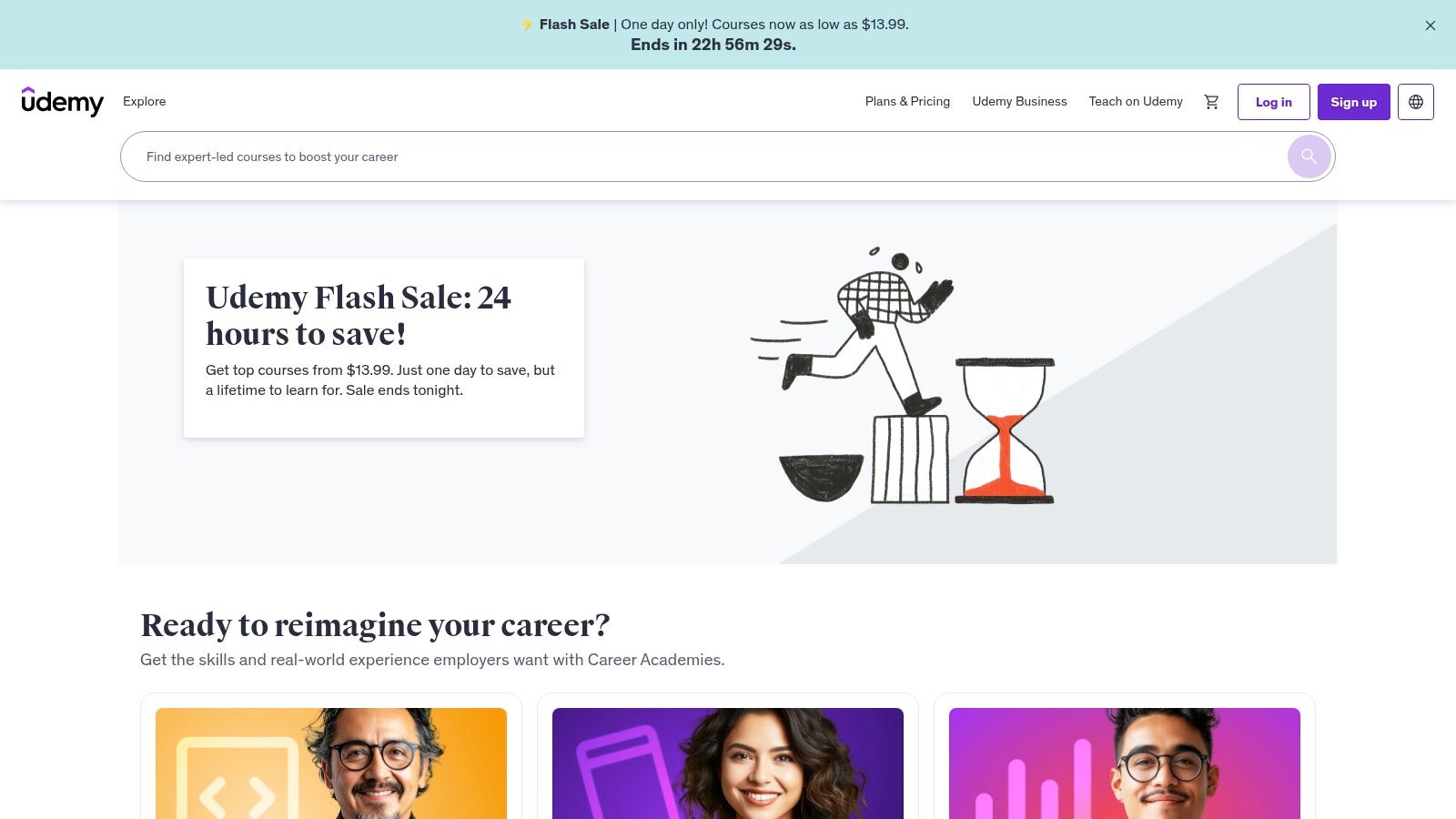
For Shopify store owners, Udemy can be a powerful channel to expand your product offerings and reach a wider audience. Imagine you sell handmade jewelry on Shopify. You could create a Udemy course teaching jewelry-making techniques, driving traffic back to your Shopify store to purchase the materials and tools needed for the course. Similarly, arts and crafts business owners can use Udemy to teach their unique skills and generate leads for their workshops or custom-made products. A potter could create a course on wheel throwing, then direct students to their online store to purchase finished pieces or sign up for in-person classes.
Udemy offers a robust suite of tools for course creation, including video hosting, payment processing, and customer service. They also handle the marketing and promotion of your courses through their platform, increasing your course’s visibility. The Udemy mobile app allows students to access your content on the go, further expanding your reach. This all-in-one approach eliminates many of the technical hurdles associated with creating and selling online courses, allowing you to focus on content creation.
Features:
- Access to a massive built-in audience of potential students
- Course creation tools including video hosting
- Payment processing and customer service handled by Udemy
- Marketing and promotion of courses through the Udemy platform
- Mobile app for student access
Pros:
- No upfront costs to create and publish courses
- Built-in audience eliminates the need for extensive marketing
- Potential for a high volume of sales through platform promotions
- Udemy handles all technical aspects of course delivery
Cons:
- High revenue share (Udemy takes 50-75% of revenue on marketplace sales)
- Limited control over pricing and discounting
- No access to student email addresses or direct marketing capabilities
- Strong competition and saturation in popular topics
Implementation Tips:
- Niche down: With strong competition on Udemy, focusing on a specific niche within your craft or Shopify product category will help you stand out. Instead of a general jewelry-making course, consider specializing in a particular technique or material.
- Leverage Udemy’s marketing tools: Participate in Udemy promotions and optimize your course title and description for discoverability within the marketplace.
- Cross-promote your Shopify store: Include links to your Shopify store within your course materials where appropriate, driving traffic and sales to your products.
- Engage with students: Actively participate in the course discussions and Q&A sections to build a community and foster positive reviews.
Despite the high revenue share, Udemy's vast marketplace offers a unique opportunity for Shopify store owners and arts and crafts business owners to expand their reach and monetize their expertise. If you're looking for the best platform to sell online courses and prioritize reaching a large audience quickly, Udemy is a compelling option. Udemy
Top 7 Online Course Platforms Comparison
| Platform | Key Features ✨ | User Experience ★ | Value Proposition 💰 | Target Audience 👥 |
|---|---|---|---|---|
| 🏆 Tevello | Shopify integration, courses & communities, multilingual support, automated onboarding | Seamless & customizable ★★★★ | All-in-one, upsell boosting, premium support | Shopify store owners |
| Teachable | Unlimited video hosting, white-label sites, built-in marketing tools | User-friendly & accessible ★★★★ | Complete brand control, robust analytics | Course creators & entrepreneurs |
| Thinkific | Drag-and-drop builder, unlimited courses/students, quizzes, community features | Scalable & empowering ★★★★ | No transaction fees, full content ownership | Serious online educators |
| Kajabi | All-in-one platform, automation tools, sales funnels, professional templates | Professional & comprehensive ★★★★ | Integrated marketing, premium solution (high price) | Established digital entrepreneurs |
| Podia | Simple course/membership management, integrated email marketing, embedded checkout | Easy & intuitive ★★★ | All-inclusive pricing, no transaction fees | Beginners & small creators |
| LearnWorlds | Interactive videos, social learning, SCORM compliance, advanced assessments | Engaging & interactive ★★★★ | Advanced customization and premium learning features | Online schools & professional trainers |
| Udemy | Built-in marketplace, extensive audience reach, course creation & hosting tools | Managed experience, broad reach ★★★ | No upfront costs, wide exposure but revenue sharing | Instructors seeking broad exposure |
Which Platform Will You Choose?
Finding the best platform to sell online courses can feel overwhelming with so many options available. From all-in-one platforms like Kajabi and Teachable to specialized learning management systems like Thinkific and LearnWorlds, and even open marketplaces like Udemy, each offers unique features and pricing structures. We've explored several top contenders, including Podia and Tevello, highlighting their strengths and weaknesses to help you make an informed decision. Remember, the most important takeaways when selecting a platform are to consider your budget, technical skills, marketing needs, and the level of control you want over your branding and student data. For example, if you're a Shopify store owner looking for seamless integration, a platform like Tevello might be a perfect fit, while established businesses with larger budgets might prefer the robust features of Kajabi. Arts and crafts business owners looking for a simple and affordable option may find Podia or Thinkific more suitable.
Choosing the right platform is a crucial step towards building a successful online course business. Take the time to evaluate your specific requirements, explore the free trials or demos offered by many of these platforms, and choose the one that best aligns with your goals and resources. The ideal platform will empower you to create, market, and deliver engaging learning experiences that resonate with your audience. Want to seamlessly integrate your online courses with your existing Shopify store? Check out Tevello, designed specifically for Shopify merchants, to simplify the process of selling online courses and maximize your reach. Tevello offers a powerful solution for scaling your business through engaging educational content.




